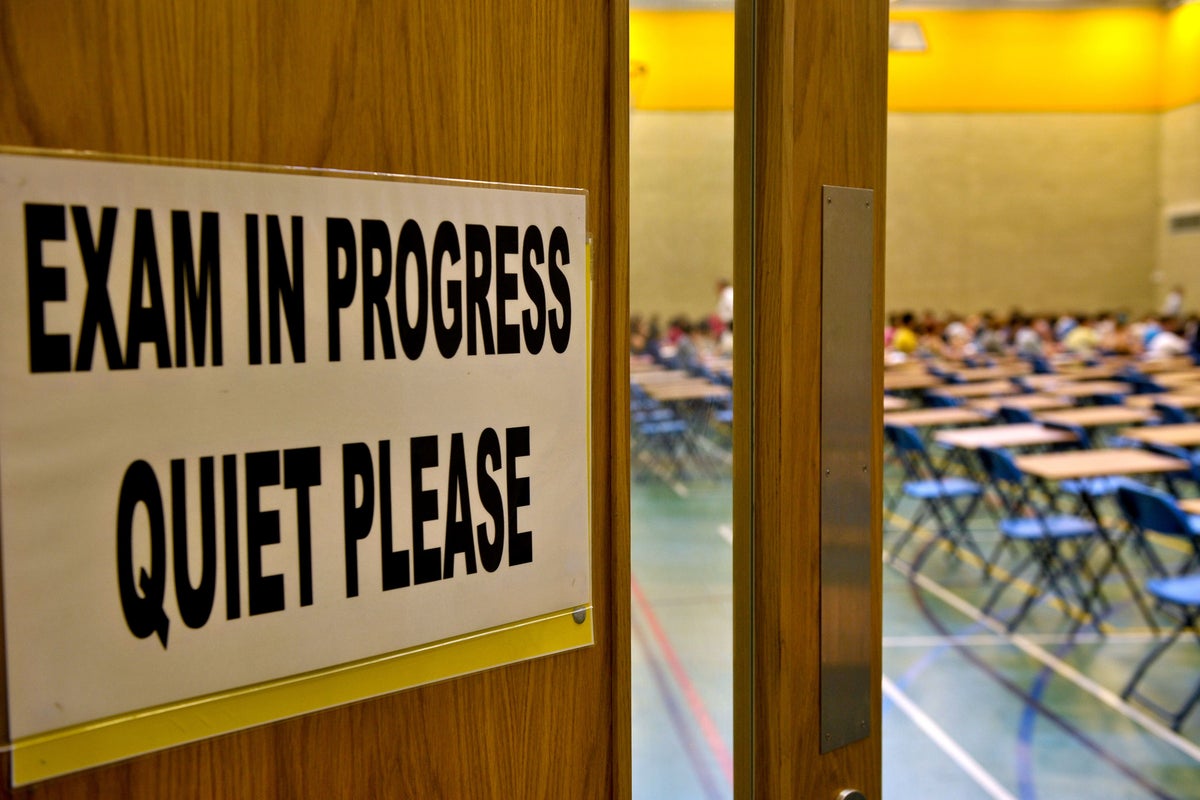
Students waiting for their A-level results are “the unluckiest” to come out of the pandemic as they face fewer top grades despite disruption to schooling, a social mobility expert has suggested.
Lee Elliot Major, professor of social mobility at the University of Exeter, said this year’s A-level cohort need support and guidance as they will be experiencing “the highest levels of anxiety and uncertainty”.
Ahead of A-level results day next week, Prof Elliot Major said tens of thousands of students may miss out on a place at their preferred university if they do not meet their predicted grades this summer because the race for elite university places “will be one of the most competitive in recent times”.
He warned that students from low-income homes “may lose out in this new highly competitive era, not just this year but over the next decade”.
His comments came as students across Scotland received their results for their Nationals, Highers, Advanced Highers and national certificates.
We must do all we can to provide support and guidance for a cohort who will be experiencing the highest levels of anxiety and uncertainty— Professor Lee Elliot Major, University of Exeter
In England, this year’s national A-level results will be lower than last year but they are expected to be similar to those before the pandemic.
It comes after Covid-19 led to an increase in top A-level grades in 2020 and 2021, with results based on teacher assessments instead of exams.
School leavers are expected to face more competition for university places due to a growth in 18-year-olds in the population and international demand.
Prof Elliot Major warned: “Universities are having to make hard choices about the balance of home versus international student places as they strive to secure a sustainable financial future.”
This year’s A-level cohort did not take GCSE exams two years ago and were instead awarded results determined by their teachers as a result of disruption to their schooling due to Covid-19. Pupils also faced disruption this year due to teacher strikes by members of the National Education Union (NEU).
Prof Elliot Major said: “This is in many ways the unluckiest cohort of students coming out of the pandemic. As well as the disruption to their learning since 2020, there will be fewer A-grade A-levels this year as we move back to tougher pre-pandemic grade boundaries.
“We must do all we can to provide support and guidance for a cohort who will be experiencing the highest levels of anxiety and uncertainty.”
He added: “It is crucial all these factors do not contribute to social mobility in the UK going backwards. My biggest fear is that the pandemic will widen education divides.
“Students from low-income homes, already disproportionately scarred by the pandemic, may lose out in this new highly competitive era, not just this year but over the next decade.”
He has called on universities to make wider use of contextual offers to identify young people “who have excelled despite facing incredibly tough circumstances” and to give them reduced grade offers.
Schools and colleges will be doing all they can at an anxious time to help students get their chosen university place and advising on next steps as necessary— Geoff Barton, Association of School and College Leaders
Earlier this week, education expert Professor Alan Smithers predicted that nearly 50,000 students may miss out on getting the top A-level grades they could have expected last year if grades return to pre-pandemic levels.
Nearly 100,000 fewer top A-level grades could be awarded this year compared with last year which could lead to “a lot of disappointment” among students and a possible surge in appeals, he suggested.
England, Wales, Scotland and Northern Ireland offered different levels of support to students who took exams this year, and the approaches to grading this year are set to vary.
In both Wales and Northern Ireland, exam regulators have said they do not plan to return to pre-pandemic grading until 2024.
Meanwhile, in Scotland, the Scottish Qualifications Authority (SQA) has taken a sensitive approach to grading this year.
The pass rate for exams in Scotland is down from last year, but it remains above 2019 levels, according to figures from the SQA released on Tuesday.
Geoff Barton, general secretary of the Association of School and College Leaders (ASCL), said: “The return to pre-pandemic standards, which had to happen at some point, will likely have some impact on grades but the number of university places available has not changed.
“Nevertheless, the need to provide support and guidance for this cohort will be paramount, and schools and colleges will be doing all they can at an anxious time to help students get their chosen university place and advising on next steps as necessary.”
A spokeswoman for Universities UK (UUK) said: “Applying to university is always a competitive process, but admissions teams are experts at contextualising an applicant’s achievements and understanding what grading arrangements were in place when they were studying.
“Talent is spread across every corner of the UK, and universities are exceptionally proud of their efforts to increase opportunity.
“There is still a long way to go, however, and universities look forward to welcoming many more students this autumn, including those from disadvantaged backgrounds.”







